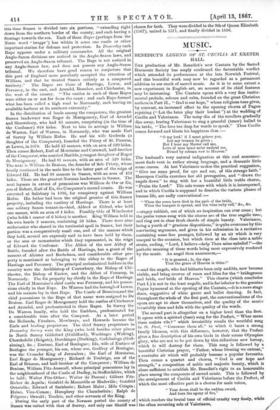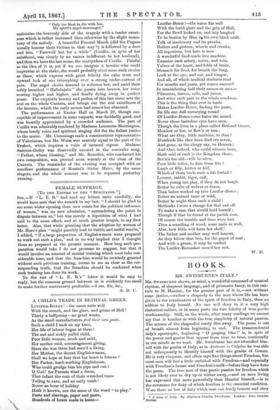MUSIC.
BENEDICT'S LEGEND OF ST. CECILIA AT EXETER
HALL.
THE production of Mr. Benedict's new Cantata by the Sacred Harmonic Society has amply confirmed the favourable verdict which attended its performance at the late Norwich Festival, and this beautiful work may now be regarded as a permanent addition to our stock of sacred music. As it is to some extent a new experiment in English-art, an account of its chief features may be interesting. The Cantata opens with a very fine instru- mental prelude, solemn and calm, founded on the great Christian
anthem in Part II., "God is our hope," whose religious tone gives, by contrast, an increased effect to the opening chorus of Pagan rejoicing (" Let the lutes play their loudest ") at the wedding of Cecilia and Valerianus. The noisy din of the revellers gradually dies away, leaving Valerianus to sing a graceful (tenor) ballad to his bride, "The love too deep for words to speak." Then Cecilia comes forward and blasts his happiness thus :—
" 0 my lord! if I must grieve you, Let my treason be given ;
But I hear my Master call me, Lore of man must ne'er enthral me, Bound by solemn vow to Heaven."
The husband's very natural indignation at this cool announce- ment finds vent in rather strong language, and a dramatic little scene ensues. At last Valerianus makes the practical suggestion, "Give me some proof, for eye and ear, of this strange faith." Hereupon Cecilia exercises her old prerogative, and "draws the angels down" to sing with her a beautiful little treble chorus, "Praise the Lord." The solo verses with which it is interspersed, and in which Cecilia is supposed to describe the various phases of human life, are sadly conventional :—
" When the roses have died in the path of the bride,
When the banquet is spread, and the wine ruby red," &c., dm.
—stagey rubbish, out of which no inspiration can ever come ; but the psalm verses sung with the chorus are of the true angelic tone, and ring out in clear fresh chords of simple beauty. Valerianus,
being a youth of "gracious dispositions," is quite overcome by this convincing argument, and gives in his submission in a recitative containing some fine passages, followed by an air which is very unequal to the occasion, but which rises at the close into a noble strain, ending, "Lord, I believe—help Thou mine unbelief !"—the pathetic meaning of these words being most expressively rendered by the music. An angel then announces,—
" It is granted ; lo, the sign That the grace of Heaven is thine !"
—and the angels, who had hitherto been only audible, now become visible, and bring crowns of roses and lilies for the "bridegroom and bride, and bride of Heaven." This chorus (which concludes
Part I.) is not in the least angelic, and is far inferior to the genuine Pagan hymeneal at the opening of the Cantata,—it is a mere stage sham, suggestive of white gauze and ballet dancing. In fact, throughout the whole of the first part, the conventionalisms of the opera are apt to show themselves, and the quality of the music invariably rises and falls with the quality of the words.
The second part is altogether on a higher level than the first. It opens with a spirited (bass) song for the Prefect, "What mean these zealots vile?" which irresistibly recalls the wrathful song in St. Paul, "Consume them all," to which it bears a strong
family likeness, with this difference, however, that the Prefect gives a fine description of his own Gods in their serene Olympian glory, who are not to be put down by this ridiculous new heresy,
which he will destroy for them. This song is followed by a beautiful Christian prayer, "Father, whose blessing we entreat,"
a contralto air which will probably become a popular favourite. Then comes a quartet and chorus, "God is our hope and strength," a composition of noble and majestic beauty, which is alone sufficient to establish Mr. Benedict's right to an honourable place among the composers of sacred music. This is followed by the arraignment of Cecilia and Valerianus before the Prefect, of which the most effective part is a chorus for male voices,
"Your doom shall be the sudden sword, And hers the agony of fire,"
which renders the brutal tone of official cruelty very finely, while the often recurring solo of Valerianus, "Only too blest to die with her, My spirit's angel-messenger," maintains the heavenly side of the tragedy with a tender sweet- ness which is rather increased than otherwise by the slight mono- tony of the melody. A beautiful Funeral March (did the Pagans usually honour their victims in that way ?) is followed by a duet and trio, "Farewell but for a while" (Cecilia, in spite of her sainthood, was clearly by no means indifferent to her husband), and then we have the last scene, the martyrdom of Cecilia. Painful as the idea of it is, yet if we can imagine a heroine who could improvise at the stake, she would probably utter some such strains as these, which express with great felicity the calm trust and upward look of one triumphing over a strong under-current of pain. The angel choirs descend to welcome her, and amid their softly breathed " Hallelujahs " she passes into heaven, her voice soaring higher and higher, and finally dying away in perfect peace. The exquisite beauty and pathos of this last scene sets the seal on the whole Cantata, and brings out the real saintliness of the heroine, which the early scenes had somewhat obscured.
The performance at Exeter Hall on March 29, though sus- ceptible of improvement in some respects, was decidedly good, and was heartily appreciated by a crowded audience. The part of Cecilia was admirably rendered by Madame Lemmens-Sherrington, whose lovely voice and spiritual singing did the the fullest justice to the music. Mr. Cummings made a conscientious representative of Valerianus, but Mr. Weiss was scarcely equal to the part of the Prefect, which requires a voice of unusual vigour. Madame Sainton-Dolby was deservedly encored in the contralto song, "Father, whose blessing," and Mr. Benedict, who conducted his own composition, was greeted most warmly at the close of the Cantata. The remainder of the evening was occupied with an excellent performance of Rossini's Stabat Mater, by the same singers, and the whole concert was to be repeated yesterday evening.































 Previous page
Previous page